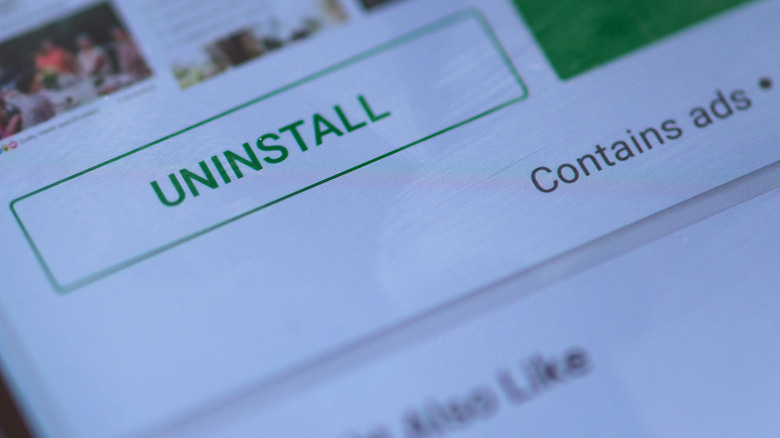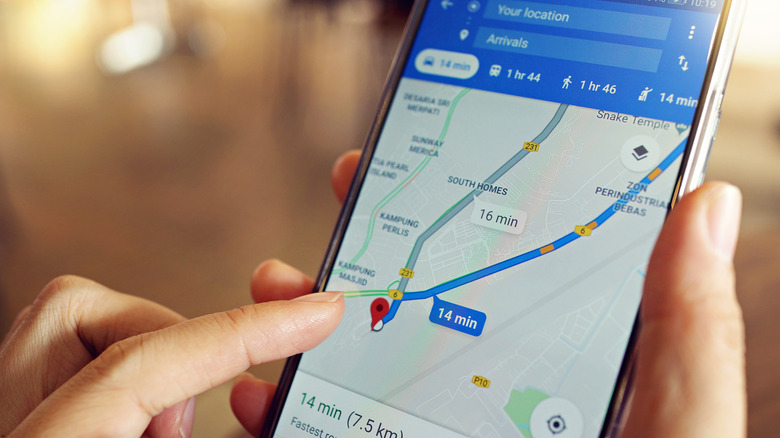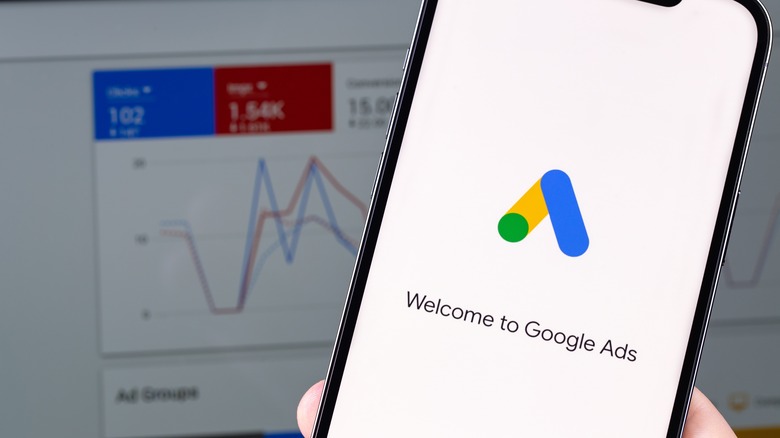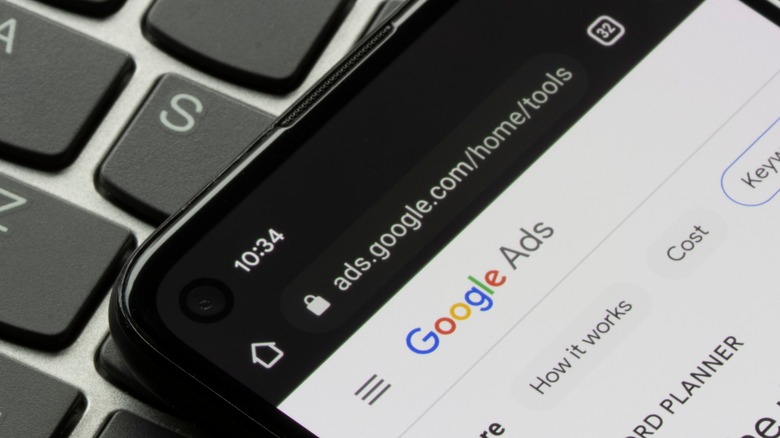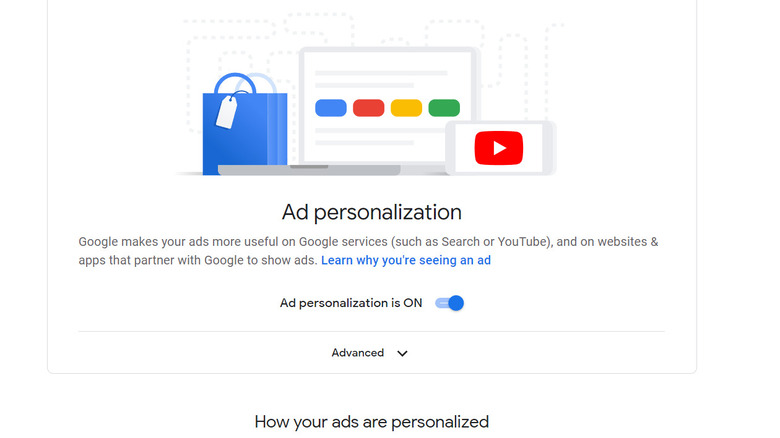Why You Need To Stop Using Ad Personalization On Your Android Phone
Alphabet Incorporated — or simply Google to most people — is hard to avoid. The company runs the most popular search engine on the web, it has developed one of the more popular browsers currently on the market, and it is also responsible for the operating system found on around half of the smartphones in the U.S. and over 70% of phones worldwide. The company also has a range of office programs, which are the equivalent of Microsoft's offerings except free, as well as some very cheap laptops, phones, a failed attempt at smartglasses, email accounts, data storage services, web hosting services, YouTube, Fitbit, Nest, Waze, analytics tools, and a host of other services that are too numerous to fit on this already long list. In short, it's really hard to avoid Google, and once you're using its services, even harder to remove the company from your life.
Most of the products it offers are free in the sense you're not being billed by Alphabet for their use. The exceptions are physical products like Chromebooks, smartwatches, and smart home devices, plus services like cloud storage once the complimentary 15 gigabytes have been used. Obviously, the company isn't selling enough Fitbits and Chromebooks to not only break even but also offer a long list of services for nothing and still be one of the most profitable companies on Earth. The way Google really makes its billions is through data. It gathers information and sells it in packages to other companies or uses it to improve its own advertising services, which account for a large portion of Alphabet's income. So how does the company get that data, what does it do with the information, and why is it time to turn off personalized ads on Android?
How Google gets your data
Alphabet compiles data on all of its users for a number of reasons. The company says it uses the data it gathers to "maintain and improve [services and apps], develop new services, measure the effectiveness of advertising, protect against fraud and abuse, and personalize content and ads you see on Google and on our partners' sites and apps." That last part is also an easy selling point. If you're selling a product that appeals to 20- to 30-year-old American women with children, for example, it's obvious any ads will be more successful if they are specifically targeting that demographic than if they're just shown to a random cross-section of people worldwide. Targeting the ad means, to the best of Google's extensive abilities, that most if not all of the ads you have paid for will be seen by someone who fits your target base.
So how does Google get this information? You actually willingly hand a good chunk of it over. If you filled out the form honestly when making your Google account, the company will have your full name, gender, cell phone number, and date of birth. It will also have access to your location every time you sign in — or constantly if you use an Android device with location services switched on — as well as the type of content you watch and like on Youtube, the kind of apps you use, your credit card information, and which websites you frequent. There are also things like the Google Opinion Rewards app, which offers Google Play Store credit in exchange for even more details about your life — including things as seemingly benign as what kind of dessert you prefer.
Google's ad reach is staggering
If what you've read so far is making you a bit paranoid, don't worry; you can view what data Google has stored on you relatively easily. Google accounts that have been active for a couple of years, like the one that was used to research this article, are likely responsible for a few gigabytes of information. If you don't like what you see and want to make a stand, but "de-googling" yourself simply isn't an option, there are still little things you can do to strike back.
If you're intent on making your information less useful to the powerful tech giant, you can consider disabling personalized ads. As we've discussed earlier, advertising makes up a large chunk of Google's revenue, and the ability to target those ads toward a specific group is a major selling point. The targeted ads show up on all Google products that include advertising, as well as on all apps and websites that use Google App Services.
Although Google's reach is well known, that last sentence doesn't quite capture the scale of its advertising program, so here's a raw statistic. According to Web Technology Surveys, Google ads appear on almost 47% of all websites. This puts it well ahead of all other companies, including fellow Silicon Valley giant Amazon, and doesn't include the ads that pop up in apps. When it comes to apps, Google itself says that 81% of Androids' top 1,000 applications — and over a million apps in total — use its AdMob program.
Why you should turn off personalized ads on Android
Spite and protest may not be particularly friendly sounding words, but they're as valid a reason as any other. By turning off personalized ads, you're becoming a bit less marketable. Google can't lump you in with a particular group and sell your information as part of a demographic. But you shouldn't turn off targeted ads on your phone solely due to a hatred of big tech. The consequences of opting into Google's targeted ad system could have far-reaching consequences for you personally and for society as a whole.
While only receiving ads about things you're already interested in sounds good on paper — you'll play more of the games, watch more of the videos, and buy more of the products you enjoy — there's also a downside. You'll only hear about things an algorithm thinks you like and may miss out on new things to try. There's also an argument that the success of targeted ads may make certain things artificially popular and have the charts to back that popularity up. If you're sick of seeing ads for another tower defense game, another clone of "Fallout Shelter," or another godawful remake of a classic movie from your childhood, know targeted ads might be part of the reason this problem exists.
The ads may be a bigger issue on phones in particular, as it's harder to shield yourself from advertising on that kind of device. Web browsers have had ad-blocking software for years, and some even come with the feature already built in. Individual apps rarely have plugins and exist within their own architecture, so it's very difficult to block an ad on an app.
How to turn off personalized ads on Android
For all its faults, Google does make it very easy to get a copy of your data and, if you want, to opt out of the targeted ads program. There is the option to opt-out of specific ads by clicking on the information in the top corner of the ad, clicking "why this ad?", and deselecting the option that says "show ads from this advertiser." Given that thousands of companies advertise with Google, stopping all ads this way would be nearly impossible. Plus, there's a chance that by opting out of certain ads, you're actually helping Google's AI learn, and further tailoring ad choices for yourself and people who share your demographic data.
So how do you opt out of all personalized ads on your mobile? To start, you need to go to your Google account's Ads Settings page. This page contains a ton of information related to you, including your age, gender, and what you've been searching for. Individual pieces of information can be removed and this may stop ads related to the thing you've removed from appearing. You can also block ads from what Google has deemed "sensitive categories" like gambling, alcohol, weight loss, and dating. To opt out completely, simply click the big switch at the top of the screen where it says "Ad personalization is on." You'll have then opted out of the program and should only receive generic ads from now on.
